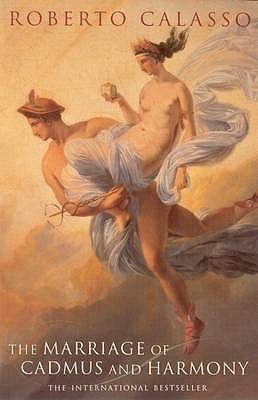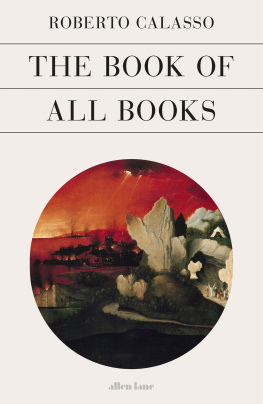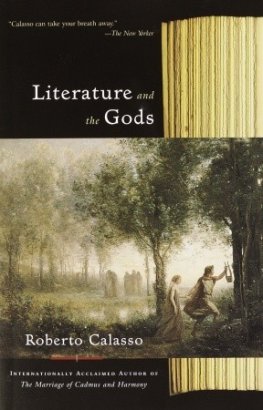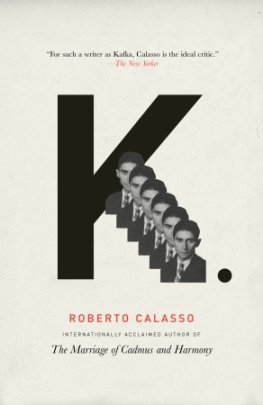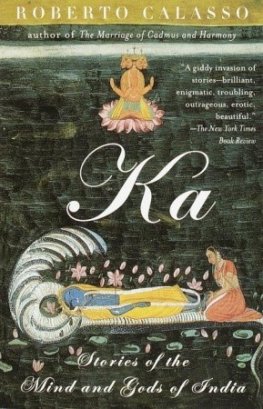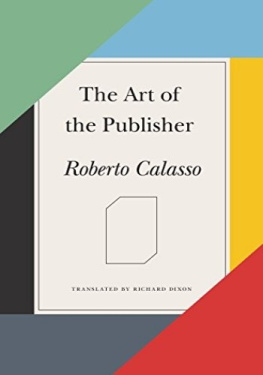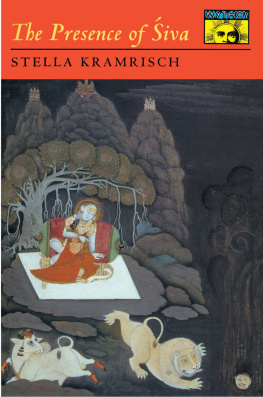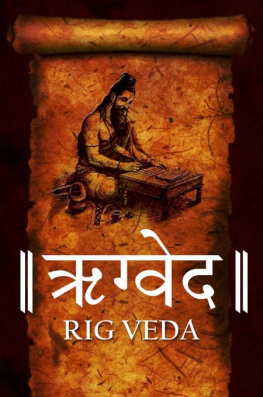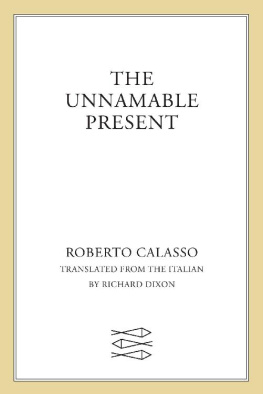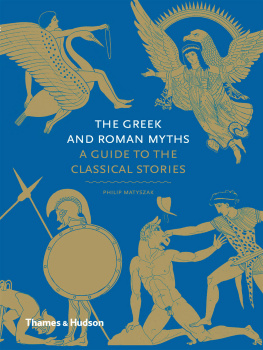Acclaim forRoberto Calassos
KA
Magnificent Calasso has done for Hindu mythology what The Marriage of Cadmus and Harmony did for Greek mythology: he has written a book that reads simultaneously like a novel and a sacred text, that ties together all the fragments of Hindu mythology into a continuous, readable, intensely detailed story.
The New Republic
All is spectacle and delight, and tiny mirrors reflecting human foibles are set into the weave, turning this retelling into the stuff of literature.
The New Yorker
Marvelously lyrical we can experience the kind of excitement that must have been felt in ancient times by those who first heard these captivating tales.
The Philadelphia Inquirer
Moving, exhilarating, extraordinary an astonishing synthesis of myths and legends, philosophical inquiry and speculative narrative. Calassos erudition is enriched by a pointillist ability to retell ancient stories in a way that captures our contemporary imaginations.
The Washington Post Book World
In Calassos retellings, the ancient stories visionary energy flares in a modern idiom. One closes the book with the sense of having tasted a way of thinking about the world that, despite being magical, probes the most fundamental questions about mortality, desire, time, selfhood and cosmos.
San Francisco Chronicle
Also by Roberto Calasso
The Marriage of Cadmus and Harmony
The Ruin of Kasch

Roberto Calasso
KA
Born in Florence, Roberto Calasso lives in Milan, where he is publisher of Adelphi. He is the author of The Ruin of Kasch and The Marriage of Cadmus and Harmony, which was the winner of Frances Prix Veillon and the Prix du Meilleur Livre Etranger.
FIRST VINTAGE INTERNATIONAL EDITION,
NOVEMBER 1999
Copyright1998 by Alfred A. Knopf, Inc.
All rights reserved under International and Pan-American Copyright Conventions. Published in the United States by Vintage Books, a division of Random House, Inc., New York, and simultaneously in Canada by Random House of Canada Limited, Toronto. Originally published in Italy as Ka by Adelphi Edizioni, S.P.A., Milan, in 1996. Copyright 1996 by Adelphi Edizioni S.P.A. Milano. This translation first published in hardcover in the United States by Alfred A. Knopf, Inc., New York, in 1998.
Vintage is a registered trademark and Vintage International and colophon are trademarks of Random House, Inc.
The Library of Congress has cataloged the Knopf edition as follows:
Calasso, Roberto.
Ka / Roberto Calasso; translated by Tim Parks.1st American ed.
p. cm.
Includes bibliographical references.
1. Mythology, GreekFiction. 2. Mythology, HinduFiction.
I. Title. II. Parks, Tim
PQ4863.A3818K3 1998
98087763
eISBN: 978-0-8041-5166-5
Author photograph by Giorgio Magister
www.vintagebooks.com
v3.1
For Joseph
The world is like the impression left by the telling of a story.
Yogavsiha, 2.3.11
Ideae enim nihil aliud sunt, quam narrationes sive historiae naturae mentales.
Spinoza, Cogitata metaphysica, 1.6
Contents
S uddenly an eagle darkened the sky. Its bright black, almost violet feathers made a moving curtain between clouds and earth. Hanging from its claws, likewise immense and stiff with terror, an elephant and a turtle skimmed the mountaintops. It seemed the bird meant to use the peaks as pointed knives to gut its prey. Only occasionally did the eagles staring eye flash out from behind the thick fronds of something held tight in its beak: a huge branch. A hundred strips of cowhide would not have sufficed to cover it.
Garua flew and remembered. It was only a few days since he had hatched from his egg and already so much had happened. Flying was the best way of thinking, of thinking things over. Who was the first person hed seen? His mother, Vinat. Beautiful in her tininess, she sat on a stone, watching his egg hatch, determinedly passive. Hers was the first eye Garua held in his own. And at once he knew that that eye was his own. Deep inside was an ember that glowed in the breeze. The same he could feel burning beneath his own feathers.
Then Garua looked around. Opposite Vinat, likewise sitting on a stone, he saw another woman, exactly like his mother. But a black bandage covered one eye. And she too seemed absorbed in contemplation. On the ground before her, Garua saw, lay a great tangle, slowly heaving and squirming. His perfect eye focused, to understand. They were snakes. Black snakes, knotted, separate, coiled, uncoiled. A moment later Garua could make out a thousand snakes eyes, coldly watching him. From behind came a voice: They are your cousins. And that woman is my sister, Kadr. We are their slaves. These were the first words his mother spoke to him.
Vinat looked up at the huge expanse that was Garua and said: My child, its time for you to know who you are. You have been born to a mother in slavery. But I was not born into slavery. I and my sister Kadr were brides of Kayapa, the great i, the seer. Slow, strong, and taciturn, Kayapa understood everything. He loved us, but apart from the absolute essentials took no care of us. He would sit motionless for hours, for daysand we had no idea what he was doing. He held up the world on the shell of his head. My sister and I longed to be doing something with ourselves. An angry energy drove us from within. At first we vied for Kayapas attention. But then we realized that he looked on us as clouds do: equally benevolent and indifferent to both. One day he called us together: it was time for him to withdraw into the forest, he said. But he didnt want to leave without granting us a favor. Immediately we thought of ourselves all alone, amid these marshes, these woods, these brambles, these dunes. Kadr needed no prompting: she asked for a thousand children, of equal splendor. Kayapa agreed. I too was quick to decide: I asked for just two children, but more beautiful and powerful than Kadrs. Kayapa raised his heavy eyelids: You will have one and a half, he said. Then he set off with his stick. We never saw him again.
Vinat went on: My child, I have kept watch over your egg for five hundred years. I didnt want the same thing to happen to you as happened to your brother Arua. Impatience got the better of me, and I opened his egg too soon. Only then did I understand what a i from a distant land, a pale and angular seer, will say one day: that impatience is the only sin. Thus was the lower half of Aruas body left unformed. No sooner had he seen me than my first child cursed me. I would be my sisters slave for five hundred years. And at the end of that time I would be saved by my other child, by you. This said, Arua ascended toward the sun. Now you can see him cross the sky every day. He is Sryas charioteer. He will never speak to me again.
Vinat went on: We were the only human beings, myself and Kadr, with a thousand black snakes about us, all of them the same, and your egg maturing imperceptibly in a pot of steaming clay. Already we loathed each other, we two sisters. But we couldnt do without each other. One evening we were squatting down on the shore of the ocean. You know that I am also called Supar, Aquilina, and perhaps thats why Im your mother. Theres nothing my eye doesnt see. Kadr has only one eye, she lost the other at Dakas sacrificeoh, but thats a story you could hardly know Yet she too has very keen sight. One evening we were heading in the same direction, bickering and bored as ever, our eyes scanning the waters of the ocean, seeking out the creatures of the deep, the pearls. A diffuse glow in the depths led us on. We didnt know where it came from. Then we turned to gaze at the oceans end, where sea joins sky. Two different lights. A sharp line separated them, the only sharp line in a world that was all vain profusion. Suddenly we saw something take shape against the light: a white horse. It raised its hooves over waters and sky, suspended there. Thus we discovered amazement. Beside the bright horse we glimpsed something dark: a log? its tail? Everything else was so distinct. That was what the world was made of, as we saw it: the expanse of the waters, the expanse of the sky, that white horse.
Next page

